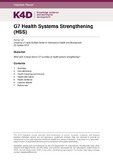| dc.contributor.author | Tull, Kerina | |
| dc.coverage.spatial | G7 countries | en |
| dc.date.accessioned | 2019-11-01T13:07:22Z | |
| dc.date.available | 2019-11-01T13:07:22Z | |
| dc.date.issued | 2019-10-25 | |
| dc.identifier.citation | Tull, K. (2019). G7 Health Systems Strengthening (HSS). K4D Helpdesk Report 679. Brighton, UK: Institute of Development Studies. | en |
| dc.identifier.uri | http://opendocs.ids.ac.uk/opendocs/handle/20.500.12413/14760 | |
| dc.description.abstract | There is no one specific definition of health systems strengthening (HSS). Also, no one method
exists for HSS that can be applied to all countries (Reich & Takemi, 2019). This rapid review focuses on methods used in HSS by the Group of Seven (G7) countries. Research from the University of Toronto shows that all G7 countries have demonstrated cooperative action in strengthening health systems, by joint initiatives with other countries and international organisations (Barnett et al., 2018). Therefore, this rapid review will focus on G7 national policies and programmes; clarifying how HSS can be more clearly defined e.g. in bilateral health cooperation, and making a case for the adoption of a comprehensive HSS strategy. Spending data and official development assistance (ODA) on health for each G7 country is compared. Data is taken from OECD, IHME, Donor Tracker, and academic research. Lessons learned from each G7 country includes The US, the UK, and Germany are the top three contributors to global health, with Italy and France the lowest contributors. Forecast analysis shows that Japan, the UK, and France are predicted to be the top three spenders for 2040, with US foreseen to spend the least. Although fears are increasing about potential cutbacks from high-income countries in ODA, as well as private contributions to nongovernmental organisations, all G7 have already committed to increasing their funding pledges for health for the 2020-2022 period. Future government health spending scenarios suggest that, with greater prioritisation of the health sector and increased government spending, health spending per capita could more than double. This will have greater impacts in countries that currently have the lowest levels of government health spending (Global Burden of Disease Health Financing Collaborator Network, 2019) | en |
| dc.language.iso | en | en |
| dc.publisher | IDS | en |
| dc.relation.ispartofseries | K4D Helpdesk Report;679 | |
| dc.rights.uri | https://www.nationalarchives.gov.uk/doc/open-government-licence/version/3/ | en |
| dc.subject | Governance | en |
| dc.subject | Health | en |
| dc.subject | Rights | en |
| dc.title | G7 Health Systems Strengthening (HSS) | en |
| dc.type | Helpdesk | en |
| dc.rights.holder | © DFID - Crown copy right 2019 | en |
| dcterms.dateAccepted | 2019-10-25 | |
| rioxxterms.funder | Department for International Development, UK Government | en |
| rioxxterms.identifier.project | K4D | en |
| rioxxterms.version | VoR | en |
| rioxxterms.funder.project | 238a9fa4-fe4a-4380-996b-995f33607ba0 | en |

